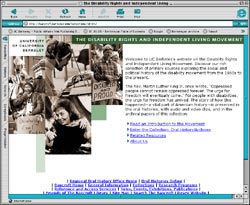Berkeleyan
ROHO launches disability-movement website
![]()
19 August 2004
| |  |
Nearly 100 in-depth oral histories and a collection of unique archival materials documenting the disability-rights and independent-living movement are now available online through a new website hosted by UC Berkeley.
The Bancroft Library’s Regional Oral History Office (ROHO) has just launched the site to make its collection of interviews with movement leaders, participants, and observers — along with documents, photographs, and audio and video clips — widely accessible.
The website provides entry to a rich historical resource for the study of the remarkable movement by people with disabilities to win legally defined civil rights and control over their own lives. Beginning in the 1960s, with strong roots on the Berkeley campus, the movement changed not only the lives of people with disabilities but also the social, cultural, and legal landscape of the nation.
The oral histories give voice to many key players in the disability community. They include activists who applied lessons from the civil-rights movement to disability rights, lobbyists and attorneys who developed disability-rights law and policy, pioneering parents of disabled children, architectural designers and community advocates focused on accessibility, professors who helped establish disability studies as a discipline, artists with disabilities, and more.
Most interviews occurred in locales long in the forefront of the fight for disability rights: Berkeley, Massachusetts, New York, Texas, Chicago, and Washington, D.C. The website helps researchers navigate the geography of the movement and delve into major themes of the collection. It links to the more than 8,000 pages of the project’s interview transcriptions in the California Digital Library — fully searchable by keyword.
“An overarching research goal was to explore how a broad group of people with disabilities across the country initiated and built this social movement, and how it evolved nationally within the context of the social and political fabric of the time,” says Ann Lage, project director. “As we proceeded, we realized we were also documenting a shift in consciousness; the oral histories revealed how people with disabilities were challenging the notion of disability as stigma and embracing the acceptance of disability as a normal facet of human diversity,” she adds.
Visitors to the website can also access audio and video clips, listening in as disability activists from across the country reflect on their past. Videotaped group interviews in Boston and New York City, for instance, show the interaction between people who have worked together for decades as they recall key moments in creating a social movement.
“The most exciting research opportunity that this work affords is the examination of the beliefs and behaviors of people whose demands for equity and justice upped the ante in the fight for an inclusive society,” Simi Linton, a disability-rights scholar from New York, said in an introduction to the oral histories.
In addition to the oral histories, the collection contains a range of compelling documents, both personal and organizational. These include poet and journalist Mark O’Brien’s published and unpublished poems and other writings; papers of Ed Roberts, noted national leader from Berkeley; and records from the World Institute on Disability, an international public-policy, research, and training center. Finding aids to the processed papers as well as selected photographs and documents will be accessible on the website.
The project was initiated by disability-community activists who understood the historical importance of the movement. They realized that early leaders were aging and their records were dispersed in basements and attics. Two grants from the National Institute on Disability and Rehabilitation Research, an agency within the U.S. Department of Education, provided funding for the groundbreaking project.
Each oral-history interviewer has personal experience with disability; most have significant disabilities themselves. Interviewers include Susan O’Hara and Sharon Bonney, both former directors of Berkeley’s Disabled Students’ Program; Disability Rights Education and Defense Fund co-founder and former president Mary Lou Breslin; Fred Pelka, Denise Jacobson, Esther Ehrlich and Harilyn Rousso, all writers on disability topics; and David Landes, Kathy Cowan, and Jonathan Young.

